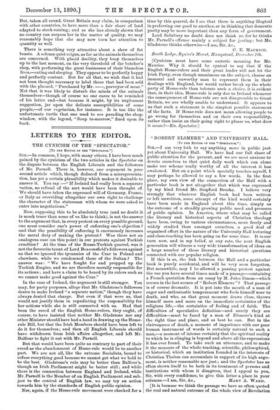LETTERS TO THE EDITOR.
THE CYNICISM OF THE "SPECTATOR."
[TO THE EDITOR OF THE "SPECTATOR."]
SIR,—In common, I hope, with many others, I have been much pained by the cynicism of the two articles in the Spectator on 'the dispute between the English Liberals and the followers of Mr. Parnell. There is, however, one argument in your second article which, though deduced from a misrepresenta- tion, has yet a certain plausibility which makes it desirable to answer it. You say :—" If Ireland had really been a separate nation, no refusal of the sort would have been thought of. We should have taken the expressed will of Germany, France, or Italy as overriding altogether our own right to challenge the character of the statesman with whom we were asked to -enter into negotiations."
Now, supposing this to be absolutely true (and no doubt it is much truer than some of us like to think), is not the answer to the argument that, in every protest on every possible ground, one must.consider one's power of enforcing one's objection ? and that the possibility of enforcing it enormously increases the moral duty of making the protest ? Was there not an analogous case (on this point) in our protests against Turkish cruelties ? At the time of the Russo-Turkish quarrel, was it mot the favourite taunt of Lord Beaconsfield's followers against us that we ignored the tyrannies of the Czar in Poland and elsewhere, while we condemned those of the Sultan ? The answer was : " We have fought for and propped up the Turkish Empire, and we are therefore morally responsible for its actions ; and have a claim to be heard by its rulers such as we cannot make good against the Czar."
In the case of Ireland, the argument is still stronger. You may, for party purposes, allege that Mr. Gladstone's followers desire to make Ireland " a separate nation," though they have always denied that charge. But even if that were so, that would not justify them in repudiating the responsibility for her actions while she is still connected with us. Had that been the creed of the English Home-rulers, they ought, of course, to have insisted that neither Mr. Gladstone nor any other Minister should have had a hand in drawing up the Home- rule Bill, but that the Irish Members should have been left to do it for themselves ; and then all English Liberals should have withdrawn from Irish affairs altogether, and left Mr. Balfour to fight it out with Mr. Parnell.
But that would have been quite as contrary to part of their creed as the abandonment of Home-rule would be to another part. We are not all, like the extreme Socialists, bound to refuse everything good because we cannot get what we hold to be the best. Gladstone's rule may be better than Balfour's, though an Irish Parliament might be better still ; and while there is the connection between England and Ireland, while Mr. Parnell is the Member of an English Parliament and sub- ject to the control of English law, we may try an action towards him by the standards of English public opinion.
Nor, again, if the Home-rule movement were checked for a time by this quarrel, do I see that there is anything illogical in preferring one good to another, or in thinking that domestic purity may be more important than any form of government.
Lord Salisbury no doubt does not think so, for he thinks Mr. Parnell's offence mainly a subject for jesting ; but Mr. Gladstone thinks otherwise.—I am, Sir, &c., C. E. MAURICE.
South Lodge, Squire's Mount, Hampstead, December 7th.
[Cynicism must have some esoteric meaning for Mr. Maurice. Why it should be cynical to say that if the English Home-rulers and their great leader will not let the Irish Party, even though unanimous on the subject, choose an immoral and unworthy man to represent them in their dealings with England, but would rather break up the whole party of Home-rule than tolerate such a choice, it is evident that, in their idea, Home-rule is only due to Ireland whenever the consequences of Home-rule are not disagreeable to Great Britain, we are wholly unable to understand. It appears to us that such a statement is the simplest possible statement of the facts. If Home-rule does not mean allowing people to go wrong for themselves and on their own responsibility, rather than insist on their going right to please us, what does it mean P—ED. Spectator...I










































 Previous page
Previous page